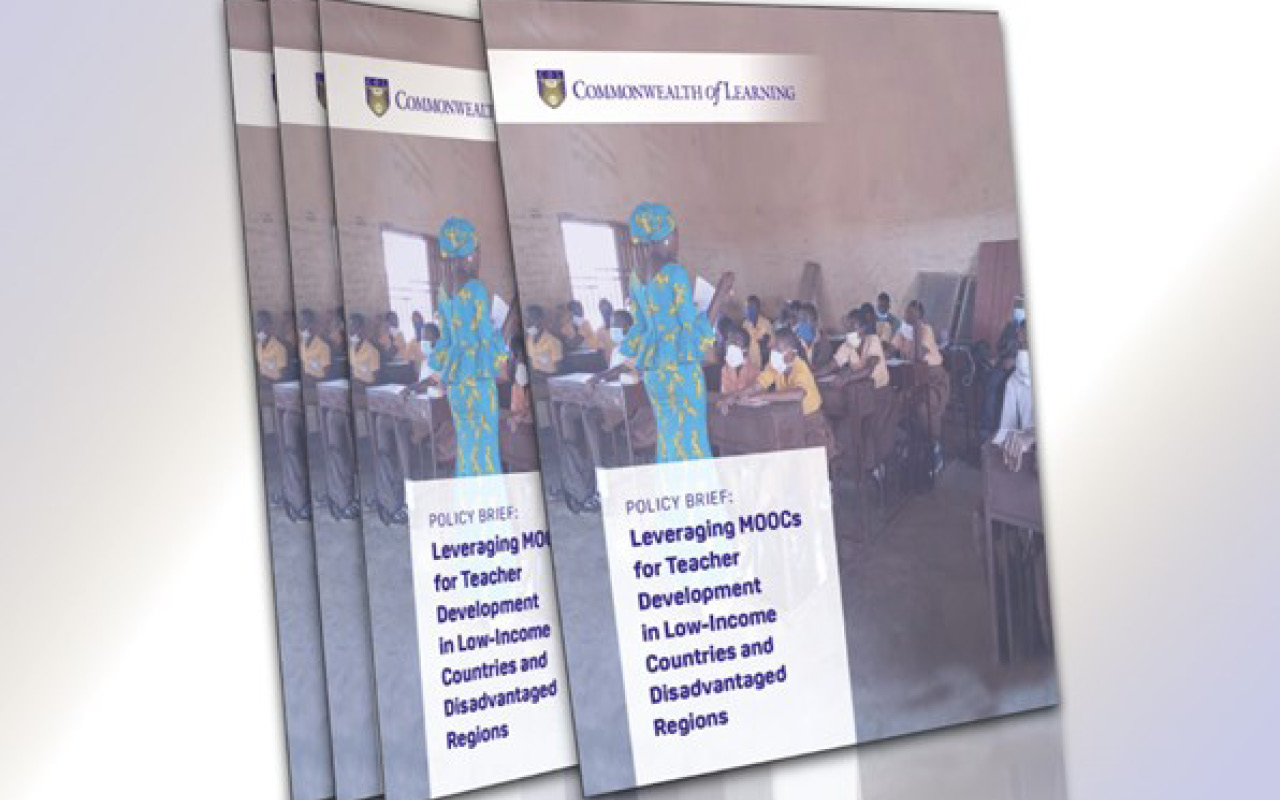
by Dr Betty Obura Ogange
COL Education Specialist: Teacher Education
The Covid-19 pandemic has drawn attention to the disparities and disadvantages inside and outside education systems globally, and to responses that might address these through policy, pedagogy and technology. There has been a rise in global open courses such as massive open online courses (MOOCs) for skills development among teachers in various contexts, including low-income and other disadvantaged regions.
COL has embraced local and international partnerships to ensure that teacher development is available and accessible to all teachers irrespective of their location or other disadvantage. There is evolving evidence that generalised and undifferentiated policy response to teacher development can only increase the disadvantage of these areas, their teachers and their schools.
A recent policy brief by COL titled Leveraging MOOCs for Teacher Development in Low-Income Countries and Disadvantaged Regions sets out a range of pedagogic and technological options that can transform globally delivered web-based courses into more nationally, culturally and regionally appropriate ones, able to reach different communities and encourage teachers to be more confident, active, creative, critical and social lifelong learners.
The policy brief complements and draws on a longer companion report that recommends that local and national policy makers would need to align recommendations on technology and pedagogy to existing national strategies, capacity, institutions, and sentiment. The following recommendations are made in the policy brief:
- Infrastructure: Teachers in ‘hard-to-reach’ communities are probably all different and diverse, even within one country or region. For each of them, specific policies and resources are necessary around infrastructure, connectivity, access, meeting spaces, and perhaps around shared or extended access to existing resources such as school computer labs or village Internet cafés, or improved social, educational or community requirements for network licensing. Off-line solutions, such as COL’s Aptus device, can help in resource sharing within small communities.
- Local languages: Global resources will not align well to local languages, cultures, environments and experiences or indeed to local curricular, teaching practices, labour markets and education systems. To achieve effective local teacher development using global resources, groups can be set up to meet online or face-to-face, organised around specific interests, sectors or projects; these groups would encourage the development of local language resources, blogs, OER, and podcasts, to compare local observations, outcomes and experiences, and to collate, critique and curate global online resources.
- Devolved decision making: The global pandemic has increased the need for rapid and local responses as successive ‘waves’ hit areas and as local services, resources and personnel become fragmented, stretched and stressed in terms of management. This suggests the need for policy-makers to support decision-making becoming devolved and delegated to local levels and for a more adaptive, responsive and flexible organisational ethos, perhaps based on the principles of the ‘agile methodologies’ .
- Local teacher communities: Policy makers should enable local teacher communities of practice to access, exploit and build on global resources, such as the COL MOOCs, by providing access to school and community Wi-Fi, meeting spaces, transport, encouraging weekly professional study time, while contributing to expenses such as airtime.
- Locally developed materials: School-based projects based on the global MOOCs can be shared with other teachers and fed back into local schools to support dialogue with community leaders. The policy makers should use local community members to help them understand their situations and challenges. An example is COL’s Teacher Network for Girls Education project (also known as TEN-G), which supports teacher mentors in marginalised communities to adapt COL MOOCs and other OER training resources in order to train female teachers and girls through on-site and other blended learning opportunities.
- Small-scale trials: Policy makers should recognise their involvement in these activities as a factor in promotion and professional advancement, support small-scale trials amongst the most disadvantaged, and measure evidence of engagement impact uptake.
- Community-specific indicators: It is essential that policy makers continue to highlight the teacher development needs of their respective low-income countries and disadvantaged regions in ways that gently move funder, donor and treasury aims and expectations away from the over-riding and unconditional emphasis on scale, cost-effectiveness and sustainability. Community-specific key performance indicators (KPIs) such as ‘number of communities reached’, ‘number of new mother tongues included’ and ‘volume of local resources developed’ should form part of the metrics for monitoring and reporting policies back to funders.
Teacher development can be supported globally and internationally by the provision of open online resources such as COL MOOCs. However, policy responses need to be targeted and calibrated specifically for countries, regions, and communities at the margins of national, mainstream norms. There needs to be greater sensitivity to diversity, difference and distance of many low-income countries and disadvantaged regions.
The information in this blog is based on COL’s publication, “ Leveraging MOOCs for Teacher Development in Low-Income Countries and Disadvantaged Regions” developed by Professor John Traxler and Dr Betty Ogange.


